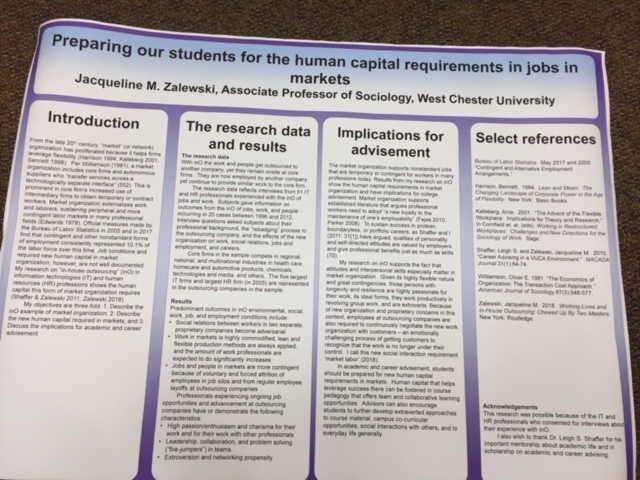Peer Persuasion: Strengthening Orientation through Peer Partnerships
Amy Rothstein & Ghadeer Abdel Jalil
Temple University
To improve its student orientation programs, Temple’s College of Science & Technology created a unique peer advising role specifically designed to assist professional advisors as they welcome new students to the University. While the University as a whole utilizes students as orientation leaders, the college’s academic presentation and registration sessions did not have student voices represented. We felt that this was a critical component to add to strengthen both student engagement and retention. This session will provide a framework for creating an orientation peer program from the recruitment and selection process to the training and implementation. We will also discuss the additional benefit of maintaining peers during the school year in a project-based role to maintain the initiatives they began over the summer.

Peering Into the Future: Benefits of Utilizing Peer Leaders
Jennifer Cirbus & Emmily Eccles
University of Mary Washington
Peering Into the Future: Benefits of Utilizing Peer Leaders
Jennifer Cirbus & Emmily Eccles
University of Mary Washington
It’s not uncommon for many in the advising field to end up taking on “other duties as assigned” while continuing to manage our advisee caseload. When tasked with creating and/or managing peer support programs in the office, we must be strategic on how to utilize an “untapped” resource: the student employees themselves. Come join us for a discussion on ways to efficiently utilize your student employees in helping to run your peer program while still balancing your advising responsibilities. This poster session will be co-facilitated by a Peer Academic Consultant who will share the personal and professional benefits they have gained since they have been given responsibility in promoting and growing their academic study skill services.

Preparing Our Students for the Human Capital Requirements in Jobs in Markets
Jacqueline Zalewski
West Chester University
Preparing Our Students for the Human Capital Requirements in Jobs in Markets
Jacqueline Zalewski
West Chester University
Markets are an “ideal type” (Parsons 1947) for nonstandard jobs across professional fields like information technologies (IT) and human resources (HR) today. I use my research on markets – i.e., IT and HR professionals experienced with the “in-house outsourcing” (in) of their work and jobs – to discuss central human capital requirements for students in this form of organization (Shaffer 2009; Shaffer & Zalewski 2011). While they represent an increasing form of employment, job conditions and human capital requisites in markets have not been well-documented. My objectives are two-fold: 1. Describe what market organization is and the in example; and 2. Describe the new human capital requirements and outcomes that support markets yet reinforce growing contingencies in jobs and work.

Reflect for Success: Using a Positive Narrative to Encourage Students on Probation
Kathy Dowden
Rutgers University - New Brunswick

Using “Flipped” and Online Advising to On-board Incoming Students
Liz Sutton
University of Pennsylvania

Reflect for Success: Using a Positive Narrative to Encourage Students on Probation
Kathy Dowden
Rutgers University - New Brunswick
Students who have suffered an Academic Standing sanction such as Probation or Suspension often feel disenfranchised from the typical college experience. What if the narrative is flipped and students are asked to focus on the positives of at-risk interventions? At Rutgers University, the Academic Standing team requires an interactive assignment where students are encouraged to reflect on their successes. They write about on-campus resources, inspirations and challenges, and provide tips to future students through vision boards. This motivational exercise is also incentivized and submissions are recognized by the college. By turning their undergraduate experience into a positive, students realize they’re not alone, and use their experience as a stepping stone to move forward with value and pride.

Sifting Through the BS (and BA): Choosing the Right Degree Path with Students
Cristine Mason & Tiffany Fortunato
Rowan University
Sifting Through the BS (and BA): Choosing the Right Degree Path with Students
Cristine Mason & Tiffany Fortunato
Rowan University
This presentation will illustrate some best practices used at Rowan to inform and explain degree types with students. It will show how-based on reality theory, career exploration, and goal setting- advisors work with students to determine the best degree path for them, and adjust their plans for coursework to match. Using advising as learning principles, the presenters will discuss some strategies employed to help students understand the differences in degree options, and ultimately make a positive decision on their academic path.
Stories from Business School Students on Academic Probation - A Grounded Theory Research
Alyssa LaPatriello
Rutgers University - Newark
Stories from Business School Students on Academic Probation - A Grounded Theory Research
Alyssa LaPatriello
Rutgers University - Newark
This presentation details the benefits of conducting grounded theory research on 30 business school students placed on academic probation. The benefits we obtained include expanded collaboration with business school advisors, intriguing findings with operational implications, affirmation of our advising model choice, and confirmation that impactful research is possible given stringent budget and staffing constraints. This research can benefit presentation attendees by providing new insights into a population that can be challenging to support.
Using “Flipped” and Online Advising to On-board Incoming Students
Liz Sutton
University of Pennsylvania
In the face of rising enrollment and limited resources, the Wharton Undergraduate Division has been struggling to properly advise our incoming students. We see many students who are confused and overwhelmed despite having access to online course-planning and registration resources. Inspired by colleagues in the College at UPenn and in NACADA, we have embarked on developing a summer online "course" that familiarizes students with the Wharton Undergraduate Division, provides an overview of the curriculum, and walks students through first-semester course selection. The course uses videos, quizzes, and assignments to create an interactive experience and to keep students accountable. This presentation will provide an interactive worksheet that will guide participants through concept mapping and project planning to create a flipped advising experience of your own!

No comments:
Post a Comment